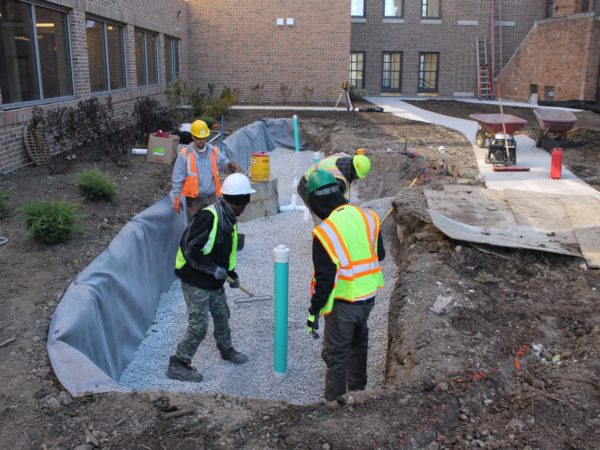
By Brett Walton, Circle of Blue
When an early summer heat wave enveloped the Great Lakes region last month, Cleveland officials stepped in to offer relief.
They reminded residents of the availability of splash pads for outdoor water recreation. And they extended hours at air-conditioned recreation centers designated as public places to cool off.
Despite the certainty of Cleveland’s responses to heat emergencies, another critical city service operates in a grey area when temperatures soar. Cleveland set two daily heat records in the third week of June as temperatures pushed into the mid-90s. But the city’s water utility, Cleveland Water, does not have an official policy that prohibits households with overdue water bills from having their water turned off during a heat wave.
The water utility can choose to halt disconnections, but there is no guarantee. “We understand the importance of uninterrupted water service for our customers and strive to minimize any disruptions whenever possible,” Danielle Miklos, a spokesperson for Cleveland Water, wrote in an email to Circle of Blue. But the department declined to answer follow-up questions about whether the utility has suspended shutoffs in recent years during other heat waves, or how its leaders would make that decision.
Cleveland has company in this regard. Circle of Blue contacted the eight largest U.S. cities in the Great Lakes basin, as well as Toronto, the largest Canadian city along the lakes, to learn their policies on water shutoffs and extreme heat.
Four cities – Chicago, Milwaukee, Rochester, and Toronto – do not shut off water at all, regardless of temperature. They tack the overdue balance onto the property tax bill, or handle late payments by other means.
Buffalo has a narrower approach, not shutting off water for low-income customers.
Other utilities do turn off water for late payments, and they look at each heat wave on its own merits.
For the Detroit Water and Sewerage Department, the utility director can decide to suspend shutoffs during extreme heat. The last time that happened was before the pandemic, according to Bryan Peckinpaugh, the department’s public affairs director.
“The administration evaluates the weather in an ongoing basis, including for heat waves, and makes a determination as necessary,” Peckinpaugh wrote to Circle of Blue in an email.
Toledo Water has the option of suspending shutoffs based on excessive heat advisories or warnings from the National Weather Service, said Rachel Hart, a city spokesperson.
Grand Rapids does not have a policy prohibiting shutoffs during extreme heat. “We do review severe weather situations and can suspend shutoffs if there may be an impact,” Steve Guitar, a city spokesperson, told Circle of Blue. “With that said, it is a very infrequent occurrence.”
Heat waves, however, are likely to become more frequent in future years. The buildup of greenhouse gases in the atmosphere from burning fossil fuels and clearing forests is causing average temperatures to rise steadily. The Great Lakes region is warming, but unevenly. Though the number of days with high temperatures above 95 degrees has decreased in the region, the hot days are now arriving in more clusters. The number of heat waves has roughly doubled since the 1960s and the period in which heat waves occur has expanded by more than six weeks.
“In general, I would say it is reasonable to think the next 50 years will see changes as large or larger than the past 50 years,” Richard Rood, a professor emeritus of climate science at the University of Michigan, told Circle of Blue.
For cities that do shut off water for overdue water bills, finding an example of a large city with protections during extreme heat means looking outside the basin. Philadelphia suspends shutoffs when its Department of Public Health declares a Heat Health Emergency. Ten such emergencies have been declared since 2017, when the system was put in place.
Within the basin, one small city has similar protections – the Chicago suburb of Harvey, home to about 20,000 people. In 2019, the Harvey City Council passed a water, sewer, and refuse bill of rights. The law lists the conditions under which the city will not shut off water. The benchmark is when the National Weather Service issues a freeze warning or an excessive heat warning.
These policies appear helpful, said Greg Pierce, director of the UCLA Human Right to Water Solutions Lab. But he said there are significant blind spots.
“Not shutting off new people – of course they should do that,” Pierce told Circle of Blue. “But it’s low-hanging fruit to point to equity in their shutoff policy.”
Pierce said a more effective strategy would be to prohibit shutoffs for a longer period of time, and during extremely hot days to restore service to households where water is already shut off. Restoring service – because it requires additional action on the part of the water utility – is more laborious than choosing not to send out the shutoff crew.
The Philadelphia Water Department has tried in the past to restore service during heat emergencies, said Brian Rademaekers, a spokesperson. But it is not part of the policy and is not universal.
For Pierce, this highlights the main deficiency of heat-related shutoff suspensions. “It’s symbolic if you’re not doing more.”
Catch more news at Great Lakes Now:
Will Michigan’s Largest Water Provider Target Tiny City For Next Shutoffs?
Featured image: Sun rays break through the clouds above Toronto in June 2024. Toronto is one of the Great Lakes cities that does not shut off water for late payment. Photo © J. Carl Ganter / Circle of Blue




